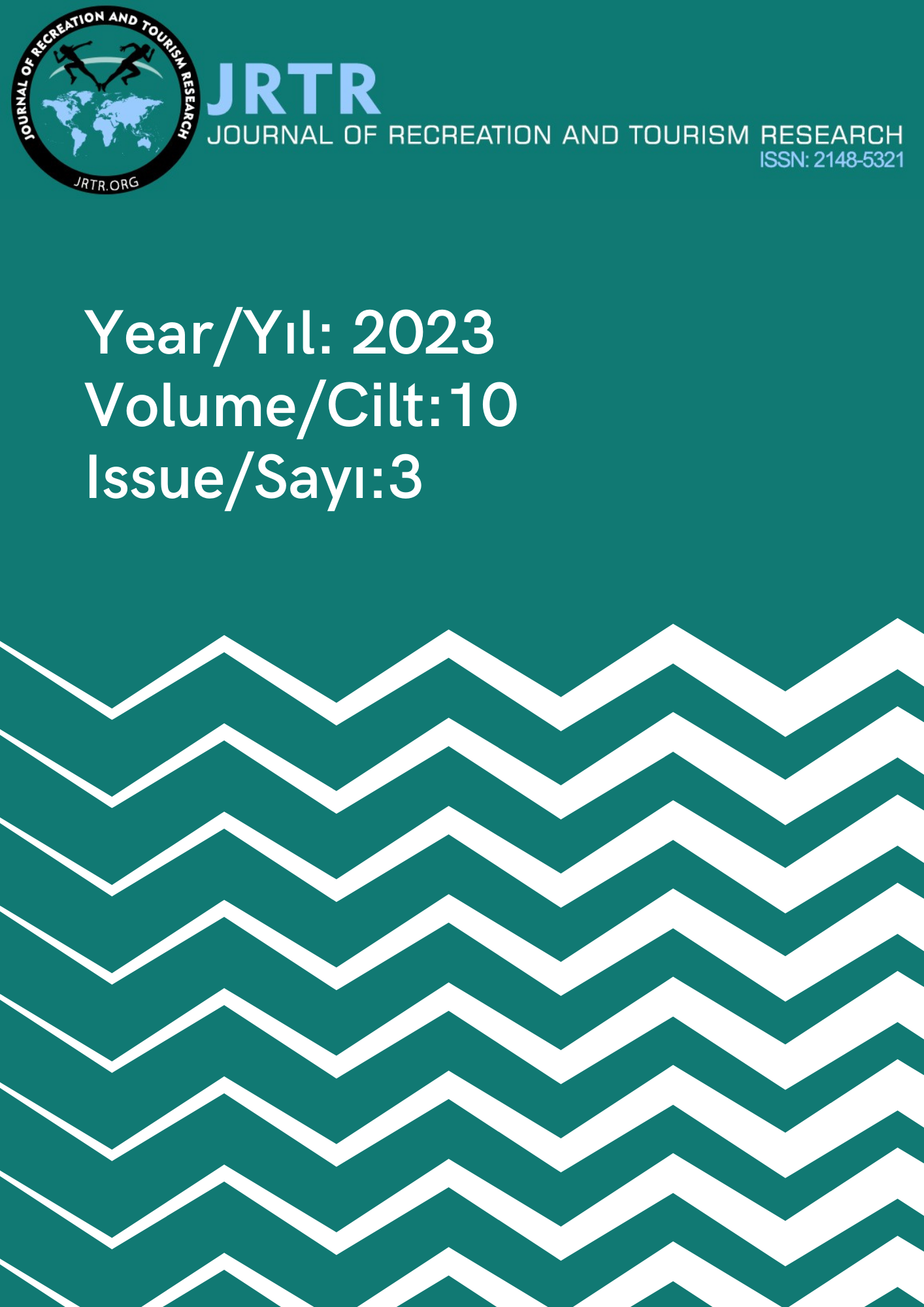Examining the Relationship Between Teachers' Levels of Participation in Recreational Activities and Their Job Satisfaction
DOI:
https://doi.org/10.5281/zenodo.8393291Keywords:
Recreation, Physical Activity, Social Activity, Leisure Participation, Job SatisfactionAbstract
The aim of this article is to reveal the job satisfaction levels of teachers with the recreational activities they frequently do in their leisure time and to examine the effect of recreation activities on job satisfaction in more detail. For this purpose, data was collected from 392 teachers working in Ankara via an online survey form. The survey form consists of three parts: personal information form, leisure participation scale and job satisfaction scale. The obtained data were transferred to the SPSS 27.0 program and frequency, mean, standard deviation, skewness, kurtosis, correlation and regression analyses' were performed. As a result of the research, it was found that participation in recreational activities during leisure time increases job Satisfaction (p <0.01). Additionally, participation in physical and social activities has been shown to increase job satisfaction (p <0.01).
Downloads
References
Akmal, F., Zainol, F. A., Mansor, M. and Ghazali, Z. (2012). Recreational program and its association with job satisfaction. Asian Social Science. 8(13), 172.
Altunışık, R., Coşkun, R., Bayraktaroğlu, S. ve Yıldırım, E. (2010). Sosyal Bilimlerde Araştırma Yöntemleri SPSS Uygulamalı. Sakarya: Sakarya Yayıcılık.
Barutçugil, İ. (2004). Stratejik İnsan Kaynakları Yönetimi. İstanbul: Kariyer Yayıncılık, 145-148.
Başol, O. ve Çömlekçi, M. F. (2020). İş tatmini ölçeğinin uyarlanması: geçerlik ve güvenirlik çalışması. Kırklareli Üniversitesi Sosyal Bilimler Meslek Yüksekokulu Dergisi. 1(2), 17-31.
Bozkurt, Ö. ve Bozkurt, İ. (2008). İş tatminini etkileyen işletme içi faktörlerin eğitim sektörü açısından değerlendirilmesine yönelik bir alan araştırması. Doğuş Üniversitesi Dergisi. 9(1), 1-18.
Brayfıeld, A. and Rothe, H. F. (1951). An index of job satisfaction. Journal of Applied Psychology. 35(5), 307-311.
Can, Y. ve Soyer, F. (2008). Beden eğitimi öğretmenlerinin sosyo ekonomik beklentileri ile iş tatmini arasındaki ilişki. Gazi Üniversitesi Gazi Eğitim Fakültesi Dergisi. 28(1), 61-74.
Canbolat, P. ve Yavuz, E. (2019). İşgörenlere yönelik olarak düzenlenen rekreasyon aktivitelerinin örgütsel sessizliğe etkisi. İşletme Araştırmaları Dergisi. 11(2), 1262-1269.
Chin-Tsai, K. (2013). Leisure involvement, leisure benefits, quality of life, and job satisfaction. A case study on 2011 creating sports island plan in ChiaYi City, Taiwan held by sports affairs council, executive yuan. International Review of Management and Business Research. 2(2), 421.
Çokluk, Ö., Şekercioğlu, G. ve Büyüköztürk, Ş. (2010). Sosyal Bilimler İçin Çok Değişkenli İstatistik SPSS ve LISREL Uygulamaları. Ankra: Pegem.
Davis, K. and Nestrom, J.W. (1985). Human Behavior at work: Organizational Behavior, (7 edition). McGraw Hill, 109.
Dere, G. ve Günay, M. (2022). Fiziksel Aktivitenin Çalışanların İş Performansı Üzerine Etkileri. İstanbul: Efe Akademi Yayınları.
Judge, T. A., Locke, E. A., Durham, C. C. and Kluger, A. N. (1998). Dispositional effects on job and life satisfaction: the role of core evaluations. Journal Of Applied Psychology. 83(1); 17-34.
Kılıç, M. Y. (2020). Otantik liderlik davranışlarının, örgütsel adalet ve öğretmenlerin iş tatmini üzerine etkisinin incelenmesi. Kastamonu Education Journal. 28(6), 2271-2283. doi: 10.24106/kefdergi.4121
Koç, H. ve Topaloğlu, M. (2012). İşletmeler İçin Yönetim Bilimi, (İkinci Baskı). Ankara: Seçkin Yayıncılık.
Koç, M. C. ve Er, Y. (2020). Leisure satisfaction and job satisfaction: a research on academics. African Educational Research Journal. 8(2), 329-341.
Leitner, J. M. ve Leitner F. S. (1996). Leisure Enhancement. London: The Haworth Press.
Parker, S. (1979). The Sociology of Leisure. London: George Allen and Unwin LTD.
Procidano, M. E. and Heller, K. (1983). Measures of perceived social support from friends and from family: three validation studies. American Journal of CommunityPsychology. 11(1), 1-24.
Saracho, O. N. and Spodek, B. (1995). Children's play and early childhood education: Insights from history and theory. Journal of Education. 177(3), 129-148.
Schermerhorn, J. R., Hunt, J. G. and Osborn, R. N. (2010). Organizational Behavior (11th Edition). Hoboken : John Wiley & Sons.
Sevil, T. (2015). Terapatik Rekreasyonel Aktivitelere Katılımın Yaşlıların Algıladıkları Boş Zaman Tatmini, Yaşam Tatmini ve Yaşam Kalitesine Etkisi. Yayımlanmamış Doktora Tezi, Anadolu Üniversitesi Sağlık Bilimleri Enstitüsü, Eskişehir.
Shannon, A. R. (2003). The relationship between organized recreational programs and job satisfaction/retention in the United States Navy (Doctoral dissertation, University of Connecticut).
Shujat, S. and Ameer, F. (2011). Effects of recreational and entertainment activities on employees job satisfaction: a case study. IBT Journal of Business Studies (JBS). 1(1).
Spector, P. E. (1997). Job Satisfaction: Application, Assessment, Cause, and Consequences, Thousand Oaks. CA: Sage.
Tabachnick, G. B. and Fidell, L. S. (2013). Using Multivariate Statistics (6th ed.). Pearson.
Toker, B. (2007). Konaklama işletmelerinde iş doyumu: demografik değişkenlerin iş doyumu faktörlerine etkisi üzerine bir çalışma. Yaşar Üniversitesi E-Dergisi. 2(6), 591-615.
Ural, A. ve Kılıç, İ. (2021). Bilimsel Araştırma Süreci ve SPSS ile Veri Analizi. Ankara: Detay Yayıncılık.
Weiskopf, D. C. (1982). Recreation and leisure. Improving the quality of life (No. Ed. 2). Allyn and Bacon, Inc..
İnternet Kaynakları
Ankara Valilik, (2023). http://www.ankara.gov.tr/ Erişim Tarihi: 27/08/2023.
İstatistik.MEB, (2023). https://istatistik.meb.gov.tr/ Erişim Tarihi: 06/09/2023
Downloads
Published
How to Cite
Issue
Section
License
Copyright (c) 2023 Journal of Recreation and Tourism Research

This work is licensed under a Creative Commons Attribution-NonCommercial 4.0 International License.






